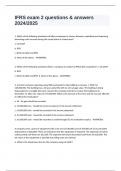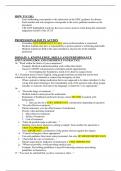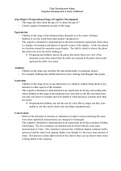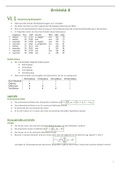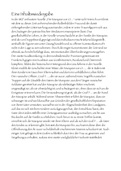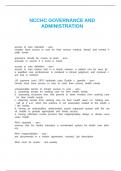BUSINESS MANAGEMENT 142:
UNDERSTANDING THIS MODULE: (Not prescribed – used for own understanding)
,CHAPTER 1: INVESTMENT CONCEPTS:
Introduction:
There are two ways of creating wealth:
1. Speculation
- Venture your money on an activity with an expectancy of a large return after a
short period. This requires a degree of expertise but is risky.
2. Investments
- Purchase an asset with the purpose of retaining it for a considerable period. Either
to increase the value or provide a reasonable return.
3. Gambling is NOT an investment but a decision to execute an activity without any
knowledge of what the outcome may be.
We need to distinguish between investment and speculation.
Investment Speculation
Term Long period (5+ years) Short term (1-2 years at
most).
Motive Requires a reasonable Requires a considerable
return. return.
What are the objectives (goals) of investments?
Speculation: Buying asset (property, stocks, options, cattle) with a goal to sell it for a
substantial profit within 1 year.
Income: Buy asset with aim to generate income (property – rental; shares – dividend;
fixed deposit – interest)
Capital growth: Is an increase in the value of an asset or investment over time.
- For example, you buy house R500 000 and sell after 10 years for R5.5m (R5m capital
growth).
- Capital growth can help protect an investor's purchasing power by allowing their
investment to keep pace with or outpace the rate of inflation.
- Inflation is the general increase of prices and fall in the purchasing value of money.
- Investors will try obtaining a capital growth that equals current inflation rate.
Take-overs and mergers: A merger involves the mutual decision of two companies to
combine and become one entity. A takeover, or acquisition, is usually the purchase of a
smaller company by a larger one.
- A takeover for example, buy a 2nd neighbouring farm to farm more effectively and an
example of a merger, would be Takealot and Kalahari becoming 1 entity.
,Control over raw material or distribution channel: Set of interdependent
organizations involved in the process of making a product/service available for use
/consumption.
- For example, a farmer would buy a neighbouring farm to gain access to the river or a
shoe manufacturer buys several retail shoe stores to sell his manufactured shoes
exclusively to these stores.
In this chapter we look at investment concepts, we consider 16 concepts:
1. Financial instruments and financial securities:
Financial instruments:
- Monetary contract between parties and a collective term for all assets, or units of
capital that are tradable.
- Tradability emphasised – the ability to transfer ownership. Tradability of the value
paper that serves as a security.
- Value paper can either be virtual or real document.
- For example: The ability to transfer ownership of an asset from one person to
another, such as selling shares.
, Financial securities:
Financial instrument that can represent the following:
- Investment as an owner in corporation (share).
- Creditor relationship with corporation or governmental body (bond/debenture).
- Rights to ownership (represented as by an option).
Emphasis is on the guaranteed function – Ability to use value paper as
guarantee/security when applying for loans, overdraft, facilities.
To simplify, financial securities are financial instruments that have monetary value and
can be traded. Not all financial instruments are securities, but all securities are financial
instruments. Shares, bonds, and gilts are all financial securities (they are financial
assets that can be traded!).
Shares (equity based financial security):
Companies issue shares Investors buy these
shares.
- Small units of capital that a company
consists of.
- Originated due to seeking large amounts
of money and seeking limited liability.
Companies issue shares:
- With the purpose of raising money from investors to expand, merge, acquire
land/buildings/PPE, settle debt, purchase equipment etc.
- Shares issued to the public.
- Limited liability (shareholders (owners) of the company is not personally responsible
for the company's debts or losses beyond the amount they invested in purchasing the
company's shares).
Investors buy shares:
- For a stake in the company’s equity. Share in its profits in the form of dividends.
Aptitude to vote at general meetings of shareholders.
Share certificate is a document (paper) issued to shareholder as proof of share
ownership. However, it disappeared due to dematerialization. Shares are now
purchased electronically, and shares are held in electronic record.
UNDERSTANDING THIS MODULE: (Not prescribed – used for own understanding)
,CHAPTER 1: INVESTMENT CONCEPTS:
Introduction:
There are two ways of creating wealth:
1. Speculation
- Venture your money on an activity with an expectancy of a large return after a
short period. This requires a degree of expertise but is risky.
2. Investments
- Purchase an asset with the purpose of retaining it for a considerable period. Either
to increase the value or provide a reasonable return.
3. Gambling is NOT an investment but a decision to execute an activity without any
knowledge of what the outcome may be.
We need to distinguish between investment and speculation.
Investment Speculation
Term Long period (5+ years) Short term (1-2 years at
most).
Motive Requires a reasonable Requires a considerable
return. return.
What are the objectives (goals) of investments?
Speculation: Buying asset (property, stocks, options, cattle) with a goal to sell it for a
substantial profit within 1 year.
Income: Buy asset with aim to generate income (property – rental; shares – dividend;
fixed deposit – interest)
Capital growth: Is an increase in the value of an asset or investment over time.
- For example, you buy house R500 000 and sell after 10 years for R5.5m (R5m capital
growth).
- Capital growth can help protect an investor's purchasing power by allowing their
investment to keep pace with or outpace the rate of inflation.
- Inflation is the general increase of prices and fall in the purchasing value of money.
- Investors will try obtaining a capital growth that equals current inflation rate.
Take-overs and mergers: A merger involves the mutual decision of two companies to
combine and become one entity. A takeover, or acquisition, is usually the purchase of a
smaller company by a larger one.
- A takeover for example, buy a 2nd neighbouring farm to farm more effectively and an
example of a merger, would be Takealot and Kalahari becoming 1 entity.
,Control over raw material or distribution channel: Set of interdependent
organizations involved in the process of making a product/service available for use
/consumption.
- For example, a farmer would buy a neighbouring farm to gain access to the river or a
shoe manufacturer buys several retail shoe stores to sell his manufactured shoes
exclusively to these stores.
In this chapter we look at investment concepts, we consider 16 concepts:
1. Financial instruments and financial securities:
Financial instruments:
- Monetary contract between parties and a collective term for all assets, or units of
capital that are tradable.
- Tradability emphasised – the ability to transfer ownership. Tradability of the value
paper that serves as a security.
- Value paper can either be virtual or real document.
- For example: The ability to transfer ownership of an asset from one person to
another, such as selling shares.
, Financial securities:
Financial instrument that can represent the following:
- Investment as an owner in corporation (share).
- Creditor relationship with corporation or governmental body (bond/debenture).
- Rights to ownership (represented as by an option).
Emphasis is on the guaranteed function – Ability to use value paper as
guarantee/security when applying for loans, overdraft, facilities.
To simplify, financial securities are financial instruments that have monetary value and
can be traded. Not all financial instruments are securities, but all securities are financial
instruments. Shares, bonds, and gilts are all financial securities (they are financial
assets that can be traded!).
Shares (equity based financial security):
Companies issue shares Investors buy these
shares.
- Small units of capital that a company
consists of.
- Originated due to seeking large amounts
of money and seeking limited liability.
Companies issue shares:
- With the purpose of raising money from investors to expand, merge, acquire
land/buildings/PPE, settle debt, purchase equipment etc.
- Shares issued to the public.
- Limited liability (shareholders (owners) of the company is not personally responsible
for the company's debts or losses beyond the amount they invested in purchasing the
company's shares).
Investors buy shares:
- For a stake in the company’s equity. Share in its profits in the form of dividends.
Aptitude to vote at general meetings of shareholders.
Share certificate is a document (paper) issued to shareholder as proof of share
ownership. However, it disappeared due to dematerialization. Shares are now
purchased electronically, and shares are held in electronic record.

